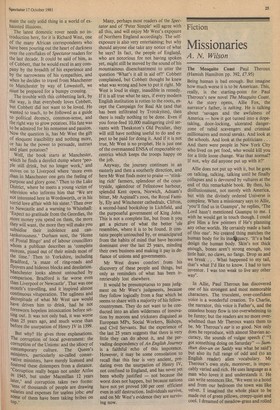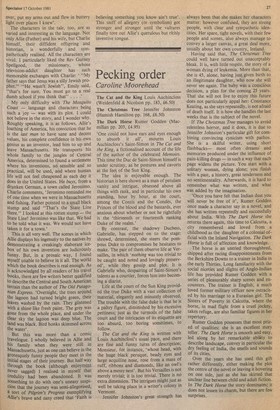Fiction
Missionaries
A. N. Wilson
The Mosquito Coast Paul Theroux (Hamish Hamilton pp. 392, £7.95) Being human is bad enough. But imagine how much worse it is to be American. This, really, is the starting-point for Paul Theroux's new novel The Mosquito Coast. As the story opens, Allie Fox, the narrator's father, is talking. He is talking about 'savages and the awfulness of America — how it got turned into a dopetaking, door-locking, ulcerated dangerzone of rabid scavengers and criminal millionaires and moral sneaks. And look at the schools. And look at the politicians. . . And there were people in New York City who lived on pet food, who would kill you for a little loose change. Was that normal? If not, why did anyone put up with it?'
Allie does not put up with it, but he goes on talking, talking, talking until he finally collapses and is devoured by vultures at the end of this remarkable book. By then, his disillusionment, not merely with America, but with the divinely ordered Universe is complete. When a missionary says to Allie, 'you'll find us in Guampu', he replies, 'The Lord hasn't mentioned Guampu to me. I wish he would get in touch though. I could give Him a few pointers if He's planning any other worlds. He certainly made a hash of this one'. No created thing matches the human body for its inackOquacy. 'It's a bad design the human body. Skin's not thick enough, bones aren't strong enough, too little hair, no claws, no fangs. Drop us and we break . . . What happened to my tail, that's what I'd like to know. I had to turn inventor. I was too weak to live any other way'.
In Allie, Paul Theroux has discovered one of his strongest and most memorable characters. The truculent, over-confident voice is a wonderful creation. To Charlie, the narrator, this voice is Father's, and the ceaseless bossy flow is too overwhelming to be funny; but the readers are no more overwhelmed than Mr Theroux wants them to be. Mr Theroux's ear is so good. Not only does he reproduce, with almost Shavian accuracy, the sounds of vulgar speech (` "I got something doing on Saturday" — Sumthun doo-un on Saddy was what he said') but also its full range of odd and (to an English reader) alien vocabulary. Mr Theroux's own style, moreover, is impeccably varied and rich. He uses language as a man who loves it and understands it. He can write sentences like, 'We went to a hotel and from our bedroom the town was like velvet. I imagined the whole place to be made out of green pillows, creepy-quiet and cool. I dreamed of meadow-grass and rolled over, put my arms out and flew in buttery light over places I knew'.
The characters in the tale, too, are as varied and interesting as the language. Not only Allie (Father) and his wife, but Charlie himself, their diffident offspring and historian, is wonderfully and sympathetically realised. All the characters are vivid. I particularly liked the Rev Gurney Spellgood, the missionary, whose television-addict daughter has such memorable exchanges with Charlie: "My father says that Jesus was a silly Jewish prophet." "He wasn't Jewish", Emily said, "that's for sure. You must go to a real dumb school if you think that" . . .
My only difficulty with The Mosquito Coast — language and characters being such a joy — was with its plot. I could not believe in the story, and I wonder why. Roughly speaking, it is as follows. Allie's loathing of America, his conviction that he is the last man to have sane and decent values, his complete confidence in his own genius as an inventor, lead him to up and leave Massachusetts. He transports his whole family to the jungles of Central America, determined to found a settlement where his inventions, so sensible and so practical, will be used, and where human life will not feel cheapened as each day it does in the United States. He buys, from a drunken German, a town called Jeronimo. Charlie comments, 'Jeronimo reminded me of one time when we were in Massachusetts and fishing. Father pointed to a small black stump and said "That's the State Line there." I looked at this rotten stump — the State Line! Jeronimo was like that. We had to be told what it was. We would not have taken it for a town.'
This is all very well. The scenes in which Allie displays his ingenuity to the natives by demonstrating a creakingly elaborate icebox of his own invention are ludicrously funny. But, in a prosaic way, I found myself unable to believe in it all. The world Which the book describes is real enough. As is acknowledged by all readers of his travel books, there are few writers better qualified to describe the Central and South American terrain than the author of The Old Patagonian Express. 'Overnight, the trees around the lagoon had turned bright green, their leaves washed by the rain. They glistened With a shine like fresh paint. The grey was gone from the whole place, and under the Clear sky the lagoon was deep blue. The land was black. Bird honks skimmed across the water'.
But this was more than a comic travelogue. I wholly believed in Allie and his family when they were still in Massachusetts, just as one can believe in the grotesquely funny people they meet in the initial stages of their journey. But half way through the book (although enjoyment never sagged) I realised in myself that credulity had been abandoned. It was something to do with one's uneasy suspicion that the journey was semi-allegorised, a sort of Pilgrim's Progress exemplifying Allie's brave and zany creed that 'Faith is believing something you know ain't true'. This sniff of allegory (or symbolism) got stronger and stronger until the vultures finally tore out Allie's querulous but richly inventive tongue.







































 Previous page
Previous page